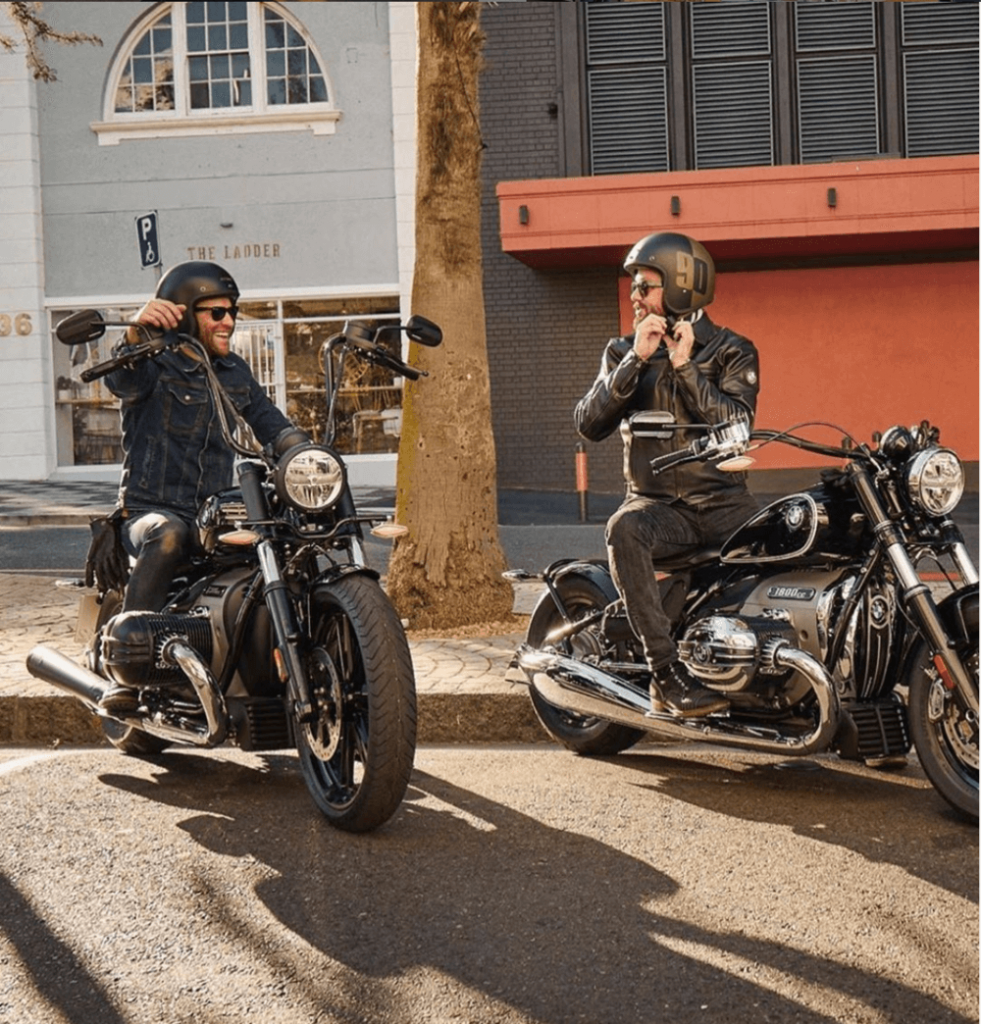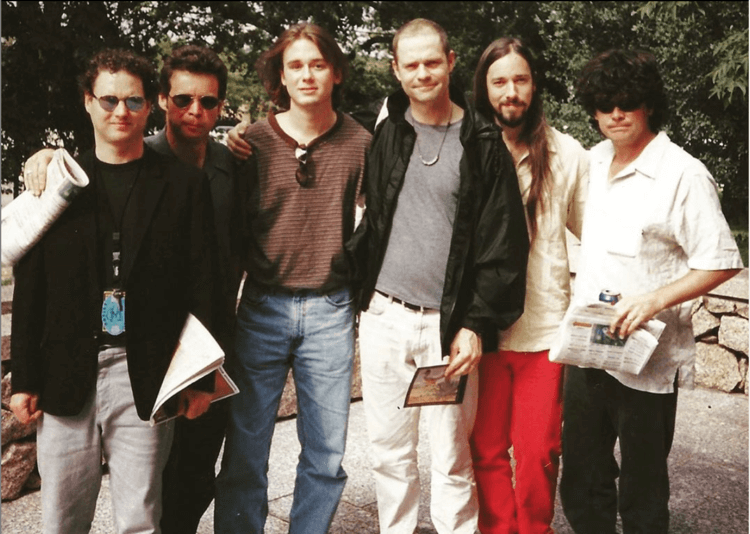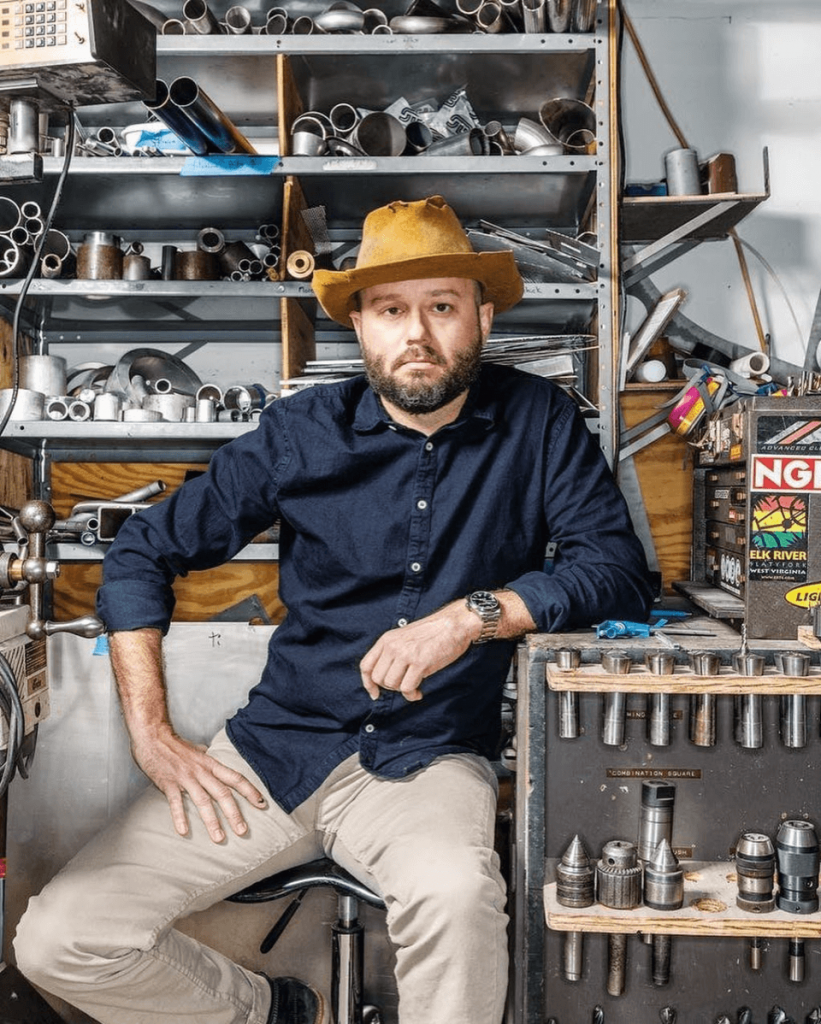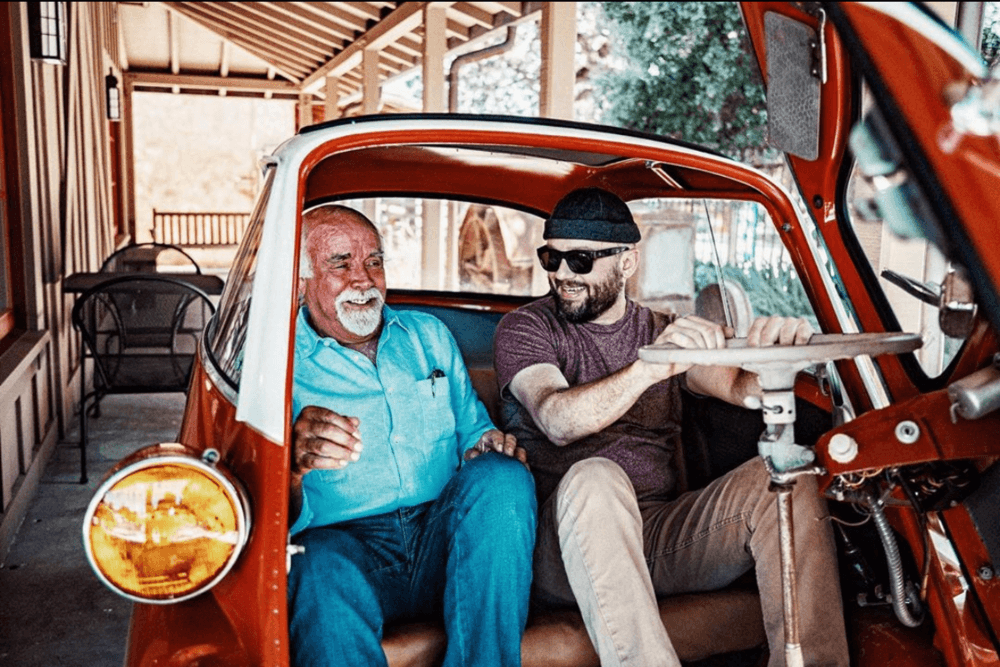“It took me a while to see what really was important in life and it’s not anyone acknowledging your achievements, it’s ALL internal.”
Many of us don’t often take time to reflect on our careers, what it took to get here and where we’re headed. As part of an ongoing series we’re interviewing professionals in and around the automobile and electric automobile industries to share their stories and wisdom for younger professionals to consider as they forge their own careers. Alan is the owner and founder of revival cycles, a custom and antique motorcycle shop, store, and lifestyle brand.
JCDP:
How did you get started in motorcycles? What was it that set you on the path toward building a motorcycle lifestyle brand?
Alan Stulberg:
At five years old, I was given a motorcycle by my granddad, so I could say that it started right there, that day. I became really interested in not just riding motorcycles, but the mechanics of the machine and how it took a magical liquid and propelled me into the unknown without assistance.
I, unlike a lot of people I grew up with, didn’t go to college or finish college until I was an adult. I was a bit of an underachiever as far as my education was concerned in high school. I didn’t get the grades that I had the ability to obtain. There was no part of high school that I wanted to participate in, other than friends, girls and some of the extracurricular more physically engaging parts of school. I moved away to Canada for a couple of years after high school, and then I eventually came back to Austin to attend community college. For many years, I floundered between working full time for technology companies and dozens of other jobs all while attempting to go to college to get a degree I wasn’t even sure I needed. It was all predicated upon outside expectations of others and the desired acceptance of society, not about my own internal drive or desires.
I got a bachelor’s degree in applied arts and sciences focusing on business management and finance at the age of 32. The moment I finished that milestone, I accepted a position working for a software solutions company. Within less than a year, I was fired from that position, not for performance issues, but because I was the sort of person that if I saw what I perceived to be injustice, dishonesty, political maneuvering or anything that I thought was morally questionable, I would stand up and say something. I was the type of guy who simply didn’t know how to keep my opinions to myself. I wore everything on my sleeve and that simply didn’t stand up in a professional environment rife with protocols and hierarchy based on handshakes and seniority. .
Being fired from that job threw me into an emotional tailspin of sorts. Everything was in question. Eventually I was able to recognize that it was by far my favorite job ever and yet, if I was honest with myself, I still largely hated everything about my existence within my position. It was a major emotional blow for me. I interviewed for other jobs, but there wasn’t one that felt right to take. In hindsight, I’d come to realize that chasing a career working for someone else’s dream or vision would likely NEVER work out for me and I had no clue what to do instead.
So, what does one do when lost in the middle of life?…. I took off to Europe for six months on a motorcycle with no real goal in sight. I sold everything I had to make it work and when I came back 6 months later, I was full of vision and understanding from self-reflection, but suddenly I was living on someone’s couch, homeless.

“In hindsight, I’d come to realize that chasing a career working for someone else’s dream or vision would likely NEVER work out for me.”
I started up Revival with a vision of not having to return to work, to be honest. I took the thing that I was already passionate and interested in, then turned it into my job. It’s a cliche thing to say, but it really was desperation that got me motivated to try. There are tons of people who claim they are passionate about their work, but for me, I really was and still am. I had to find something I didn’t feel like I had to force myself into every single day and Revival was my vehicle.
I don’t care who you are, eating spinach every day is a tough thing. No matter how good it is for you, there is nobody who can eat spinach every single day and nothing else. That’s how I began to feel about my previous jobs, it was the same thing every day. No matter how much they paid me and no matter how nice the people were, I was eating the same thing everyday. I knew I wasn’t going to be able to continue to do that.
I had a vision that I would start up a company that centered around the things I was interested in and passionate about simply because it needed to keep me interested day in and day out.
In 2008, I started my company completely on my own. For two and a half years, I had no partners or investors, I only had a few broken motorcycles and a vision for something larger. I had plenty of emotional collaborators and people to bounce ideas off of and to share in those ideas, but my peer group was more than hesitant to leave their path to join me. Eventually, I convinced a new like-minded friend to become my business partner who was able to fill the technical skills that I lacked. I saw each day as another opportunity to promote personal and creative growth in myself, but also for Revival to be recognized with a reputation of brand excellence. I was self-taught, taking photos, creating a website, designing the logo and making the business cards. I was always unafraid to ask for help and advice from more skilled friends, but I was mostly just winging every single move.
I carefully curated my own vision of how those things might be executed, which is really just a manifestation of how I grew up, which was that we didn’t have much. I was raised by a single mother and if I wanted to eventually ride a motorcycle or drive a car, I was more than likely going to end up with something broken or very well used.
In my opinion, I belong to the luckiest of generations simply because the instant availability of information, knowledge and teaching (ie. the internet). The internet came of age as I came of age and this happened when I was young enough to embrace the shift and use it to thrive, not ever taking it for granted. I still remember what it was like when you had to use encyclopedias or the library to learn and l remember what it’s like when you had to mail a letter to formally communicate. I don’t take for granted the fact that there’s an infinite amount of communication ability with the rest of the world. So, what a huge leg up, ostensibly inside of a couple of years, I can learn 30 years worth of knowledge and experience from my laptop.
JCDP:
After you finished high school, what was it that took you up to Canada?
Alan Stulberg:
A girl. My dad is Canadian citizen, although he was raised in Texas, and he transferred up there when my parents divorced. I had met a girl while up there while I was visiting him when I was 15. Years later, we reconnected and I moved up there to be with her and to simply change my scenery.
This was back in 1995, so the US economy wasn’t in the best shape and it was in even worse shape in Canada. After a few years I moved back to Austin because the economy was really beginning to show signs of a boom here. Once home, I got a job immediately working for Motorola making silicon chips. I stayed for a few years working from midnight to noon, four days a week, and then trying to go to school three days a week in the mornings. It was a rough double life that I struggled with intensely. Attempting to split my energy and focus in those two worlds of working and school was extremely challenging. In hindsight, it sounds woefully simple and straightforward, as I did not lack energy, I just couldn’t excel at either one so both efforts felt like failure.

While still working at Motorola, I was recruited to work for Dell Computers with a slightly more accommodating schedule for school. At Dell, I helped manufacture and burn-in software onto new machines in the portables department. I found it satisfying and could balance school and friends, but I was recruited away to work for Trilogy Software and a dot come start-up that was auto related. This was the dot com boom of the late 90s and it was one of 3 different start-ups I managed to sink my teeth into. After something like $100MM was spent, Trilogy shut down the operations of my group and I tried to start up a small service company doing home automation and audio equipment. That didn’t last very long because I realized it was a huge grind with no margin.
After much self reflection and being mentored by a cousin doing well in the brokerage world, I chose to step into the finance world where I was a broker and a financial planner. I learned a lot about finance and how it fit into the world of business. I had a natural knack for it and obviously it was lucrative. I felt I’d found my grind. That was when I changed my college major from architecture to finance because THIS was my ticket to validation, respect and financial freedom. With this career path, I felt I could finally make enough money for me to live the lifestyle that I wanted to have outside of my work. Within a year or so the same problems appeared. I was bored, unmotivated and certainly unfulfilled. I was making enough money to live and do whatever I’d like, butI realized that I wasn’t the kind of person that could do that. I couldn’t just go to work to do something that I didn’t really, really care about or was truly emotionally engaged in. It took a while, but I eventually walked away from that world and chose to attempt to attend school full time. The entertaining part is that as soon as I finished my bachelor’s degree, I managed to get the best job I’d ever had, got fired, and finally set out on my own and started up Revival.
JCPD:
How did you know it was time to move on from one thing to the next?
Alan Stulberg:
I was most definitely a late bloomer figuring out where to push my life and career. I say that now because I once thought that everybody else had it all figured out and that I was the only one lost. I suffered in that transitional stage, trying to do two things at once, which was go to work and go to school and attempt to apply myself 100% to both. In hindsight, it was doomed from the start. I didn’t do anything half. I was the guy that ran as fast as he could into everything and pacing myself just wasn’t possible. I also truly suffered from low self-esteem likely being made worse by my lack of objective pacing and I was in an emotional place of not knowing why I was struggling.. I thought it was because I didn’t have “the” girlfriend or maybe I was lazy or a loser. The shakeup of the transition was this realization that I needed to make, and that was the recognition that I wasn’t lazy, I was just completely lost as to where to point my focus. I now think this is mostly universal and natural, but at that time I thought I was alone in my struggle.
The one thing I really excelled at doing was seeking out the people that I thought could give me advice or that were on a path that I wanted to emulate. I think most people don’t do that, because they’re completely afraid of reaching out, of being vulnerable, of swallowing pride and showing ignorance or simply afraid of rejection. It’s so simple! They don’t recognize that someone like me, who’s not exactly the most successful guy, but successful enough in what I do, that if you ask me for my advice, I would give it to you. Why wouldn’t I?
If you tell the world what you want, the odds are so much more significant that you’re going to get it. If you ask the world lots of great questions and listen closely to ALL of the answers you receive you’ll process all that information and hopefully output something that works for you and applies to your vision of the world….or rather helps you to reshape it. I think that without a doubt, the most valuable thing you can do in life is to seek out the people that are where you want to be or headed in that direction. If you don’t ask out of fear or any other stumbling block, it’s a total waste because everyone really wants to talk about themselves anyway. Well, not everyone, but if you keep looking you’ll find the guy/gal that can tell you what you need to know and understand.
As for the transition, for me it was obvious. I didn’t figure this out with some big plan and grand unique ideas with a clear vision. I was just in a bad place and I was desperate. I had to find something that I cared about and that didn’t feel like work. It’s that simple.
JCDP:
Given everything you’ve done and been through, how did you know that this was what you wanted? Was there a particular moment that you knew that motorcycles were the direction you needed to go in?

Alan Stulberg:
Yes, I had that moment when I was staying at someone’s house in England. I met him through a friend and he’s about a year or two older than me, so he’s close to my age. I reached out to him because I ran out of people to connect to in England. I was on my motorcycle and always looking for a place to point it. A friend back in Austin knew him and said I’d like this guy. “YOU MUST MEET HIM!” So I did. I met him at a vintage motorcycle swap meet where he was selling motorcycle parts out of the back of his van as well as sleeping in his van that night. He had a house and a family, but he was very much just like this old hippie to me.
We had these long conversations until the wee hours of the morning where I learned that at a young age he had dropped out of Oxford as an engineering student, then lived in a co-op as a hippie and met this great woman. They eventually married and lived out on Land’s End, England. He was happy and had become sort of the Jesus of vintage motorcycle repair and restoration. He had found his niche as a father, partner and skilled artisan and therefore he found his way of life. The irony is the guy is now a famous television star in England, but at the time he was essentially hiding from the outside world just working on bikes in his dark workshop closed off to the public completely. We’re still friends, very close friends, and that mentorship is truly one of the cornerstones of my career. At the time, he encouraged me and I encouraged him and I’d like to think if you had to ask him, he’d say that I had an influence over him that changed his life while he helped change mine….. with perspective and clarity.
When I left here for Europe, I was not determined to do anything other than get the hell out of my comfort.
When I returned to Austin, I came back with a full focus of the only direction I wanted to head and no clear picture of where I wanted it to take me. It’s almost cliche, you know, a guy goes off on a motorcycle to figure out his life at the age of 32 and comes back with his life actually figured out. I can’t say that I came back saying, “Yeah, I got this!” I just came back thinking, “Alright, I’ve got a direction to go. I’ve got somewhere to point myself that isn’t contingent upon anyone else. It isn’t what someone else told me to do. It isn’t someone else controlling that vision, it isn’t someone else who understands exactly what I want.”
JCDP:
What were some of the major challenges when you made that transition?
Alan Stulberg:
The biggest challenge at first was convincing myself that I could do it. The second biggest challenge was feeling confident in my idea when I told those who were close to me what I wanted to do.
Once I left, like I said, I sold everything I had except for one motorcycle. I really sold everything from my guitar to my home stereo….all of it. On the outside looking in, it looked like I had lost the path when in fact, I had finally found it. It was challenging to not have that support because I’m the kind of person who relies on his personal connections to people. I now know that many of my closest friends and mentors really did think I’d lost the plot. They thought I was heading down a dead end road. Today that fact gives us all great pride. I wasn’t totally clueless. I distilled down all the advice I’d gotten into my own vision. I can’t describe how lucky I feel to have gotten that clarity.
The other biggest challenge, by far, the biggest challenge of all, was getting people to buy into my vision. It was hard to find people to work for me and with me that could stay focused on their role. In addition, a challenge that cannot be overstated in dealing with people, is dealing with egos. Those egos are a tough thing to handle when it comes to a group of very capable people, even worse when its a group of macho, overcompensating, males. Attempting to get them to trust what you see and the clarity of vision that you have. I absolutely underestimated that challenge and likely lacked the confidence to present those visions with certainty.
JCDP:
What changes in the industry are you noticing and what are you doing to prepare for that?
Alan Stulberg:
Well, I’ve always been of the mindset that people should be more connected to their belongings and the things that they own. As I mentioned, I feel lucky that some of my generation (and their parents) still worked with their hands and didn’t have immediate information/education available to them. Today, because of the service industry that has evolved and grown, there is an immediate ability to simply hire people to fix things for you. Self repair has been a dying skill for decades.
This, and the replacement economy that we’ve lived in so long, the reverse trend might be more in Revival’s favor more than anything. Right now, the motorcycle industry, as a whole, is suffering the same way as the automotive industry is suffering. This is partially because motorcycles in this country are typically seen as entertainment vehicles. They’re not commonly used for transportation alone.
The upcoming technology of modern motorcycles means they’re more reliable, so they last a lot longer. Technology is starting to eat itself at this point because there’s no need to buy a brand new motorcycle unless you’re a materialistic person who feels driven to have the newest thing. Your motorcycle from 15 years ago, still runs great if you maintained it at all.
Internal combustion is going to die because of electric technology, and yes, I believe more people are going to ride electric bikes. That’s going to further complicate the problem of consumption, which means fewer are going to consume and repurchase because an electric motorcycle has so much fewer parts and a much longer lifespan with fewer service intervals. They’re so much more reliable and user-friendly that once 30 percent of the motorcycle population embraces electric motorcycles, then it’s downhill from there. The fate of internal combustion will be sealed with the changing mindset and ultimate cultural changes that fully embrace electricity as the fuel of the future.
All you have to do is replace the wear items. If you look at the life cycle of a lithium ion battery in a motorcycle, it’s a lot longer than most people could ever even use. The current range can be 200 miles on a single charge and I don’t go 200 miles very often in my life, in fact very few people do. Only mild adjustments will need to be made to adapt as those ranges increase further and further.
I’ll always appreciate the unique aspects of the antique, internal combustion machines, the design and the ingenuity that had to go into engineering these things from an aesthetic and engineering perspective. I believe that one of the key factors that have helped Revival to thrive is our ability to capitalize on the appreciation of these machines and their design and share that love and passion with other people.

“The other biggest challenge, by far, the biggest challenge of all, was getting people to buy into my vision.”
JCDP:
Do you think people are able to spend less money over the lifecycle of their vehicle because it’s an electric bike? They could purchase an electric motorcycle, then just go ahead and invest some of that money back into customizing it.
Alan Stulberg:
What you’re talking about is experiential purchases. Even changing how a motorcycle looks is such an experience thing. No one is immune to consumption and to the materialism that’s been thrown on us from childhood. There are so many factors that make a few people rich and the rest of us just hungry for more. Experience will always sell and people are willing to pay for it. Even when we buy mass-produced goods, we want some part of it to represent ourselves as individuals. This means that a dollar saved will likely be a dollar spent individualizing or customizing.
I’m hoping that this pandemic starts to effect cultural trends and that people start to realize that experiences are more important than things. I’m lucky enough that one of the things that I sell, which is the motorcycle lifestyle or working with your hands or any of those things, are all experiential things.
We have a large motorcycle-centric event that we produce every year, which is inspired by my desire to create an experience that I would want to have myself. When I went to Europe on a motorcycle for six months, forgetting the world and what the world wanted for me, experiencing life and people and cultures and visions of our culture like art and design and architecture… these were the experiences that defined my path.
I think those experiences are how you learn about what your real priorities are. I’m not saying I don’t drive a nice car, because I do. I like my stuff, but it’s old and it’s worth as much as I paid for it five years later, but travel is a way better way to spend your money. The return of that travel is greater than driving around town in a brand new Mercedes EVERY SINGLE DAY.
JCDP:
What advice would you give to your younger self?
Alan Stulberg:
Think for yourself. Try to figure out who you are and how to think on your own, then synthesize what people are telling you and chuck them all up to things you should consider. With that defined, don’t try to be someone that you think everyone else wants you to be.
I wish someone would have said to me at age 12, “Hey man, you’re going to have to go through a lot of hard times. You think it’s bad now, it’s only going to get worse. But trust me, if you follow the path that interests you, work really damn hard, and focus on honing it, you’ll find your way.” I wish that someone had tried to convey that to me in a way that I could hear it and feel it. All I could think was that my life was never going to stack up unless I had a certain level of recognition for what I’d done. I was wrong.
In fourth grade, at Zilker Elementary, they had us put individual statements into a time capsule. I don’t remember how long it was to be buried for, I think it was a 20 year time capsule or a 10 year time capsule. All of us got to put a sheet of paper in that we had filled out with basic questions on it with our vision of the future.
I didn’t come back when they opened it, but I remember what I put in it. I remember the question said, “What would you be doing in 10 years or 20 years?” And I wrote that I’ll be driving down “The Drag” in a Lamborghini and cruising around town showing off my ride. That was it. That’s what I wrote! I didn’t want to live in Europe or be a famous artist or anything. I said I’m going to be driving some stupid car on “The Drag”.
“The Drag” was Guadalupe Street as it runs straight through University of Texas campus. As kids we used to cruise through there on our bicycles and we’d go to the arcade. The college kids would hang out there and we thought they were all the enviable people. They were the people that you wanted to be and that you wanted to impress. So, I wanted to drive a red Lamborghini down the drag. That was my goal in life. How ridiculous is that?
Now, the irony is that I’ve driven Lamborghinis and fancy cars like that many times and never once did it occur to me that I needed to drive in certain streets or for a certain person to see it or that would mean much of anything to anyone other than my twin brother. Not that long ago one of my previous bosses called me and told me when he bought a Lamborghini, and I remember thinking, “Cool, I don’t care.” Who cares, right? I feigned my interest, but I really wasn’t impressed nor did it change my respect level for him. (I respected him for very different reasons) It forced me to ask myself a question; Why is that really important as a child? It took me a while to see what really was important in life and it’s not anyone acknowledging your achievements, it’s ALL internal.






